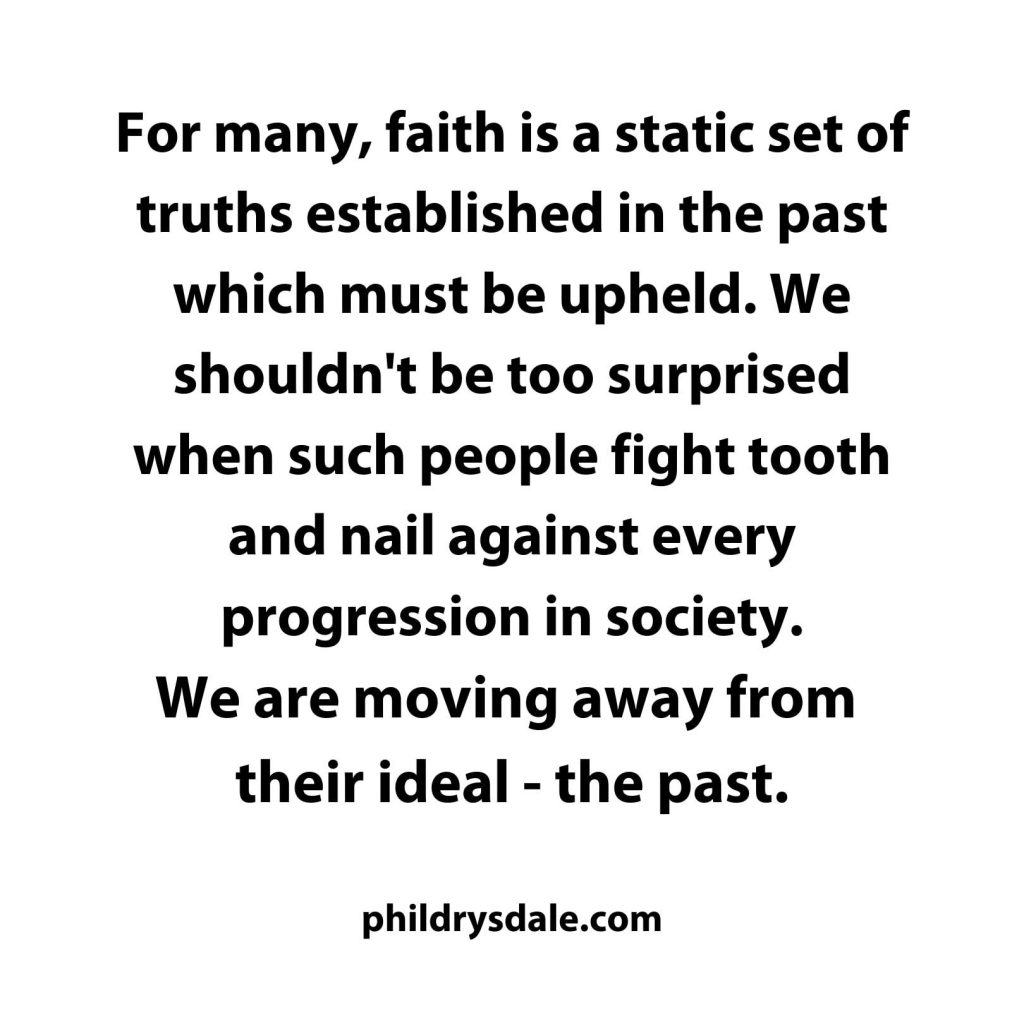I know I’ve shared a lot of stuff by Jeff Turner lately, but so much of it is prophetic and really needs to be as widely shared as possible. So I make no apology for reblogging this latest beauty from him.
As you may remember from my series on the Stages of Spiritual Growth, each of us grows in our Christian maturity in a different way, and sometimes in a different direction, from those of our peers[1]. And, understandably, sometimes those peers are shaken – often badly shaken – when they learn how we have changed in our views and beliefs.
This was exemplified to me very sharply only a couple of weeks ago, when a dear friend of mine was extremely shocked to hear that I no longer believe in ‘penal substitutionary atonement (PSA), or the concept that Jesus was punished for what I did wrong so that God would no longer be mad at me. I was devastated at my friend’s reaction, and I mean devastated on an emotional level because there’s no way I would have wanted her to be hurt by my beliefs. We go back over twenty years and we have been in many great worship meetings together (some of which I was leading) and we’ve shared life with each other through a fair bit of life’s ups and downs. Essentially, one of her core beliefs had been challenged quite out of the Blue by someone (me) for whom she has a great deal of respect, and that ‘s going to be a paradigm-shaking experience for anyone. And I appreciate that’s not going to be an easy thing to have to face, not by any means.
To her credit, my friend handled it all well – and we are still friends! – and in fact she herself said that she had grown spiritually from the experience. But still it brought it home to me that some people are genuinely concerned and even upset when they hear of ‘different’ beliefs like mine – particularly when they are expressed by close friends – despite the fact that today’s ‘orthodox’ beliefs have in fact not always been ‘orthodox’. Part of the problem is that we are not told about that point when we first believe; instead we are taught that ‘our way’ is the only way to believe; the inference is that it always has been so; and that everyone else is wrong to a greater or lesser degree. And that’s partly why it is so hard for some people to grow, because they see that growth as moving away from that which they were first taught, and that of course is ‘dangerous’ because what they were first taught is always assumed to be ‘right’. Therefore, any move away from that first learning is, almost by definition, a move into ‘error’. And that’s a move that, quite rightly, no-one wants to make.
In the past, I have kind-of assumed that most detractors against changing beliefs are simply being Pharisaical and awkward, and in some cases just in it for the argument. And, indeed, some of them really are – like the heresy hunters. However, I have learned from that recent painful experience with my friend that in fact some people are genuinely hurt by what they see as my/our rejection of much of what they hold dear.
With all that in mind, then, I’d like to share Jeff’s piece now:
 Christians love sounding the alarm whenever another’s spiritual practice diverges a bit from the norm, and they seem to be heading in a direction that makes them feel uneasy. While said alarm may need sounding, it sadly typically involves calls to return to this or that practice from yesteryear, which is nothing that in any way needs returning to. The answers we seek do not lay in returning to the manipulative, high-pressure, performance driven revival services of the past, the prayer card-scanning and scamming prophetic meetings of the seventies and eighties, or the turn or burn, hit the altar repentance-a-thons that we’ve all had the misfortune of having been in attendance at. I’m sorry, and I’m sure your devout and sincere, but I don’t believe you when you say God is telling you this is what we need. We have a generation on our hands whose nihilism, absolute disdain for religion, and eagerness to replace it with something truly meaningful, tells us all we need to know about the efficacy of how we’ve done things in the past.
Christians love sounding the alarm whenever another’s spiritual practice diverges a bit from the norm, and they seem to be heading in a direction that makes them feel uneasy. While said alarm may need sounding, it sadly typically involves calls to return to this or that practice from yesteryear, which is nothing that in any way needs returning to. The answers we seek do not lay in returning to the manipulative, high-pressure, performance driven revival services of the past, the prayer card-scanning and scamming prophetic meetings of the seventies and eighties, or the turn or burn, hit the altar repentance-a-thons that we’ve all had the misfortune of having been in attendance at. I’m sorry, and I’m sure your devout and sincere, but I don’t believe you when you say God is telling you this is what we need. We have a generation on our hands whose nihilism, absolute disdain for religion, and eagerness to replace it with something truly meaningful, tells us all we need to know about the efficacy of how we’ve done things in the past.
I don’t come from the mountaintop with the answer, but I can assure you it does not lay in the clear failures of yesterday. You might not be comfortable with where you see certain people going, but I honestly get more uncomfortable when I see people returning to practices and ways of being that they were once delivered from, and thinking of themselves as having “returned to their first love” in the process. I’d honestly rather see a person set off on a journey of their own, forge their own spiritual path, go totally bonkers for a bit (in our eyes), and actually discover who they are and who their God is, then to have them blindly turn back to tried and failed methods from the past.
If we actually want to be part of the movement “forward” we have to be willing to allow people to take uncomfortable turns, and to even go spelunking into some caves and caverns we think too deep and dark. There is no “forward” if we continually go backwards. And, no, I’m not buying that we used to be forward, and that our attempts at forwards were backwards, meaning that going backwards now would be going forwards. That actually works sometimes, like Chesterton’s search for heresy leading him to Orthodoxy. But unless we are returning to practices after having had our understanding of them *RADICALLY altered, I don’t buy it. The sons and daughters of the church must branch out and go on their own heroes journey, and, if they return, return transformed, along with their understanding of what it is they are returning to. So transformed should their understanding be, that it in no way seems to them like a return at all.
Let’s be honest: we’ve done things terribly wrong, and we don’t need to go back. We need to forge new paths and move into places we should have moved into years ago, but were too afraid to approach. I won’t be a part of a movement that was once on the cutting edge, but starts pearl-clutching like the Queen at a hillbilly Monster Truck rally, and whimpering like a dog during a fireworks display whenever things start really getting real. To be honest, I’d even rather fall into outright heresy for a season than blindly return to the heresy I left. No sir. No ma’am. No thanks. No way. I’ll pass.
– Jeff Turner, shared with his kind permission
I’d also like to share an excellent short blog post by Bob Ingle, which shows the attitude of some parts of organised Religion towards personal spiritual growth. I share this because it gives the less gentle side, very different from simply someone like my friend who was genuinely upset:
My Brother Will Rucker was recenty ask to remove the name of a Bible College he attended from his [Facebook – Ed] profile. Offended by Will’s greater understanding, the writer said “I pray that you return to the gospel that you have been taught”.
I wonder where we’d be today if Matthew, Mark, Luke, and John had returned to the gospel they’d been taught. I believe God reveals His truth in many ways, but I’m glad the Brothers participated in writing 27 new books. If they’d returned to the gospel they’d been taught there’d be no New Testament, there wouldn’t be as many Bible colleges, and Paul (Saul of Tarsus) would have continued persecuting those who didn’t believe the way he did…hmmm
Jesus’ home synagogue threw him out and tried to kill Him when he revelealed His greater understanding of the Gospel He’d been taught… The Spirit of the Lord is on me, because he has anointed me to proclaim good news to the poor. He has sent me to proclaim freedom for the prisoners and recovery of sight for the blind, to set the oppressed free...Luke 4:18-19
Brother Will, don’t look back. Some will follow, some will throw you out but rest assured, God will continue reveal a far greater understanding of The Gospel you’ve been taught.
– Bob Ingle, shared with his enthusiastic permission
Here is the link to Bob’s original blog post
I don’t know if I can add anything to all that, except maybe to reiterate that spiritual growth looks different in each individual, because each of us is unique and needs to grow in our own way, in our own time, and under the personally-tailored guidance of the Holy Spirit. Despite their concerns, it’s never going to be any other human’s place to have the final say on what that growth can or cannot look like.
Grace and Peace to you all 🙂
Footnotes
| ⇧1 | In fact, I have gone ahead and added this piece to that series, because I think that is says much that is relevant with regards to spiritual growth and therefore complements the series nicely |
|---|











